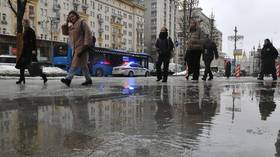AI to displace millions of jobs by 2030 – study

The deployment of artificial intelligence could deal a heavy blow to the worldwide labor market and result in massive layoffs in global companies, the World Economic Forum (WEF) Future of Jobs report published on Wednesday, warns.
The study, which surveyed hundreds of large businesses worldwide, found that 41% of companies plan to slash their workforce by 2030 in response to the increasing capabilities of AI. Further, 77% of companies are preparing to reskill and upskill their existing staff from 2025 to 2030 for better human-machine collaboration.
The report predicted that 170 million new jobs will be created by the end of the decade, while 92 million jobs will be displaced. The WEF noted that skills in AI, big data, and cybersecurity are expected to be in high demand.
“Trends such as generative AI and rapid technological shifts are upending industries and labor markets, creating both unprecedented opportunities and profound risks,” Till Leopold, the head of Work, Wages and Job Creation at the WEF, said.
The WEF said that advances in AI, robotics, and energy systems, particularly in renewable energy and environmental engineering, are expected to boost demand for specialist roles in these fields.
The report also identified job categories that will face the largest decline in numbers due to AI and other technological trends. They include service clerks, executive secretaries, payroll clerks, and graphic designers.
“The presence of both graphic designers and legal secretaries just outside the top 10 fastest-declining job roles, a first-time prediction not seen in previous editions of the Future of Jobs Report, may illustrate GenAI’s increasing capacity to perform knowledge work,” the report said.
The report stressed that the impact of AI extends beyond job displacement, highlighting the potential of the technology to augment human output, rather than replace it outright.
The WEF concluded that “human-centered skills” such as creative thinking, resilience, flexibility, and agility will continue to be critical.
Meanwhile, high-profile figures and scientists have raised concerns in recent years over the potential dangers posed by AI. Last year, computer scientist and author Paul Graham warned that the use of AI for writing will result in the majority of people losing the skill in a few decades.
The labor market will change significantly because of the adoption of advanced technology, according to Daniil Gavrilov, the head of the Artificial Intelligence Research Laboratory at T-Bank AI Research. Everything a human is capable of doing can be done by AI, and machines can do it well, he said in an interview with RIA Novosti last year.
Gavrilov noted that in the short and medium term, employees will have to master AI skills in order to remain competitive.













